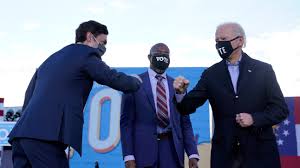
- Details
- By Levi Rickert
ATLANTA — Americans woke up Wednesday morning to the news Reverend Raphael Warnock was elected to the U.S. Senate. Warnock beat incumbent Sen. Kelly Loeffler in Georgia’s runoff election. With Warnock’s victory, the Democrats gained one seat in the Senate and inch closer to control of the Senate.
In the other race in yesterday’s election between Democrat Jon Ossoff and incumbent Sen. David Perdue, Ossoff led by a razor-thin margin of some 12,000 votes Wednesday morning. The race was too close to call with 98 percent of the vote in.
The remaining unaccounted votes are in heavily Democrat areas. If Ossoff holds on to his lead and wins the remaining undetermined Senate seat, the control of the Senate will flip to Democratic control. In that case, the Senate will be 50-50 and with incoming Vice President Kamala Harris, a Democrat, will cast votes when needed to advance the Biden administration’s agenda.
Georgia election officials say the votes should be tabulated Wednesday afternoon.
Warnock becomes the first Black senator from Georgia. He is currently pastor of Ebenezer Baptist Church in Atlanta where the Reverend Dr. Martin Luther King, Jr. pastored during the 1960s.
The Warnock-Loeffler race was called Wednesday, close to 2 a.m. – EST.
Before the race was called, Warnock in a livestream, thanked his supporters and said he would represent all citizens of Georgia, not only those who voted for him.
"We were told that we couldn't win this election, but tonight, we proved that with hope, hard work, and the people by our side, anything is possible," Warnock said. "So, Georgia, I am honored by the faith that you have shown in me. And I promise you this tonight: I am going to the Senate to work for all of Georgia."
With the control of the Senate at stake, the runoff races drew much national attention. On Monday President Trump and President-elect Biden were in Georgia to campaign for the respective candidates from their party.
More Stories Like This
Native News Weekly (August 25, 2024): D.C. BriefsNavajo Nation Mourns the Passing of Former Vice President Rex Lee Jim
Deb Haaland Earns Endorsement From Communications Workers of America Local 7076
University Soccer Standout Leads by Example
Two Native Americans Named to Democratic Congressional Campaign Committee's“Red to Blue” Program
Help us defend tribal sovereignty.
At Native News Online, our mission is rooted in telling the stories that strengthen sovereignty and uplift Indigenous voices — not just at year’s end, but every single day.
Because of your generosity last year, we were able to keep our reporters on the ground in tribal communities, at national gatherings and in the halls of Congress — covering the issues that matter most to Indian Country: sovereignty, culture, education, health and economic opportunity.
That support sustained us through a tough year in 2025. Now, as we look to the year ahead, we need your help right now to ensure warrior journalism remains strong — reporting that defends tribal sovereignty, amplifies Native truth, and holds power accountable.
 The stakes couldn't be higher. Your support keeps Native voices heard, Native stories told and Native sovereignty defended.
The stakes couldn't be higher. Your support keeps Native voices heard, Native stories told and Native sovereignty defended.
Stand with Warrior Journalism today.
Levi Rickert (Potawatomi), Editor & Publisher

